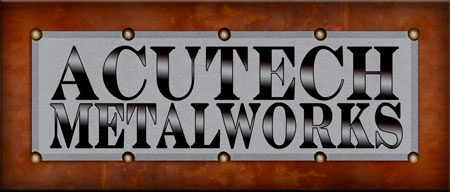Welding and Blacksmithing – We are your wrought iron expert!
Acutech delivers your custom jobs the way you envision it – with attention to detail and high-quality fabrication.
As an efficient all-in-one metal works shop, our staff has mastered the trades of welding and blacksmithing. From decorative wrought iron stair rails for the home to commercial iron gates and railings, we do it all. No job is too big or small. You can count on Acutech to fabricate your ideal finished product.
[band variation=”alternative” backgroundimage=”https://acutechworks.com/wp-content/uploads/metal-band.jpg” paddingtop=”10px” paddingbottom=”10px” inset=”yes”]
[row]
[column width=”one-half”]
[/column]
[column width=”one-half”]
[gap height=”30″]
Looking for custom wrought iron blacksmiths?
Acutech produces many pieces comprised of wrought iron and steel as there are a multitude of uses for hand forged iron. Wrought iron is a sturdy which makes it suitable for both home and commercial projects.
Acutech is the best choice for custom blacksmith projects. Call our team today at 406-892-4030.
Below are a few ideas for custom jobs. See our sister site AcutechArt.com for more ideas and images.
• wrought iron stair rails and fencing
• wrought iron railings and gates and signs
• home interior and exterior pieces such as tables and chairs
• wrought iron furniture, racks and hangers
• wrought iron fireplace screens and hand forged tools
• rustic wrought iron lighting fixtures, hand forged door handles
• iron cutlery, knife blanks, wine holders
[/column]
[/row]
[gap height=”30″]
[accordions]
[accordion title=”Learn more about Blacksmithing”]
The blacksmithing process involves heating pieces of iron until they are hot enough to be shaped and molded with tools. Hammers, anvils, and chisels are commonly used tools in blacksmith shops. A forge heats the iron being worked on by fuels such as propane, natural gas, coal, or charcoal. As the temperature of the iron increases, the color of the iron changes. At first it glows red, then orange, yellow, and white; white indicates the highest temperature before the material reaches the melting point. When the iron reaches a yellow-orange color, “forging heat,” the blacksmith works to shape it while it is malleable. Most blacksmiths typically use a hammer and anvil to change the shape of the iron or steel. Certain methods such as “drawing” or “shrinking” employ a hammer to alter the outward appearance. These methods create more depth or length by changing the other dimensions of the iron. Blacksmiths are also able to bend the metal, punch holes or create patterns on the surface. The moldable properties are present because of how the molecules of iron react to the heat applied by the forge. Blacksmithing is a unique and classic technique that can be traced back to Greek and Roman mythology.
[/accordion]
[accordion title=”Learn more about Wrought Iron”]
Wrought iron work is an ancient and rustically beautiful form of blacksmithing work that has utilitarian purposes as well. Wrought iron is different from steel and even cast iron, and there are several differences in materials that Acutech’s master smiths use. Iron is a naturally occurring metallic element that is rarely found in nature on its own. It is usually mixed with other trace impurities and found as an oxide or sulfide. One of the most popular forms of iron is wrought iron. It has a very small amount of Carbon (as small as 0.04%), and it is the purest form of iron most easily accessible to humans for manufacturing and blacksmithing purposes. Some other iron-based metals that Acutech utilizes are steel and cast iron. Steel has between 0.3% and 1.7% carbon levels and cast iron contains 2.0% to 6% carbon by weight. Since cast iron has such a high level of carbon, it cannot handle as much heat as other forms and is processed in a different fashion than wrought iron.
[/accordion]
[/accordions]

